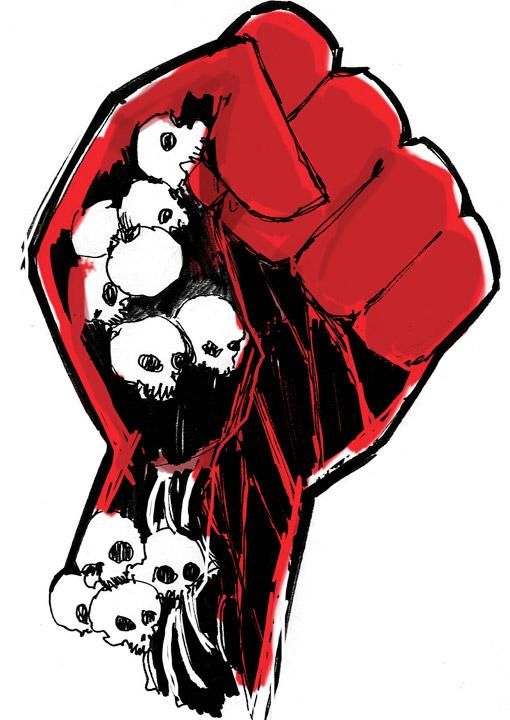Radovan Karadzic is finally in The Hague awaiting a lengthy trial for genocide and crimes against humanity. Allegedly responsible for the murder of 200,000 Bosnian Muslims and Croats and the displacement of a further one million, most ordinary people around the world grew to equate Karadzic's familiar portrait with pure evil. This is the man thought to have ordered the 1995 Srebrenica massacre when an estimated 8,000 male Muslims were systematically killed and thrown into mass graves while others were starved in concentration camps.
Few of us, other than Serb nationalists, will be tempted to commiserate with the former psychiatrist turned leader in the event he is consigned to spend the remainder of his life behind bars. If he's found guilty, as far as I'm concerned they can throw away the key.
But if I'm honest I can't help sympathising with his adopted persona Dragan David Dabic, a kindly new age guru known to local children as "Santa Claus". Dabic was a healer who wouldn't even kill bees, which he referred to as blessed, living beings, deserving of being saved.
Of course, Karadzic could have merely been playing a carefully contrived role like an actor on a stage. If so, he should be up for an Oscar since he managed to convince so many of his authentic goodness. On the other hand, Dr Dabic, who is billed on his still existent website as "one of the most prominent experts in the field of alternative medicine, bio-energy and macrobiotic diet", may have been a genuine manifestation of Karadzic's alter ego.
It's hard to reconcile the two diametrically opposed faces of Radovan Karadzic especially because we are often given to thinking in absolute terms. In other words, a person who could cruelly plan and orchestrate massacres or genocide would surely be someone who pulled the wings of butterflies as a child or took pleasure in torturing his siblings.
In our minds such an individual would be a ruthless psychopath sans any shred of conscience. This compartmentalising allows us to distance ourselves and most of humankind from such monsters, making it easier for us to consider them beyond the pale.
Chilling
In fact, what's even more chilling than the reputations of men such as Karadzic is the way they seamlessly marry their inhumanity with feelings and higher emotions that are all too human. Indeed, Karadzic is far from being alone.
The other day, I was struck by recently published photographs of people who ran Auschwitz in 1944 that had been donated to the United States Holocaust Memorial Museum. They show 70 SS members, including the notorious Dr Josef Mengele singing along to an accordionist's tune, young SS Helferinnen (female auxiliaries) sitting on a fence tucking into blackberries, and camp guards lounging on deckchairs at an SS riverside resort.
The horror of those photographs emanates from their very ordinariness. Most of them look like jolly nice people. The girls are fresh-faced and wholesome. The men enjoying relaxed camaraderie. No monstrous faces in this bunch. But wait! These were the very people who were sending men, women and children to be gassed like vermin while beating and starving others. Why weren't their crimes etched on their features for all to see and how did they keep their nightmares "if they had them" from permeating their daily lives?
I believe that extreme nationalism is the culprit. Karadzic and his "partners in crime" had something in common with Nazis. They considered themselves nationalists.
John Breuilly, author of the book Nationalism and the State defines "nationalism" as referring to "political movements seeking or exercising state power and justifying such actions with nationalist arguments that are built upon three basic assertions: There exists a nation with an explicit and peculiar character; the interests and values of this nation take priority over all other interests and values; and the nation must be as independent as possible".
Allowing the interests and values of a nation to dominate all other interests and values may account for the dichotomy seen in the characters of some nationalists. Extremist nationalism is also commonly associated with xenophobia, bigotry or racism and is based on the concept of superiority. Taken to the extreme, it labels "the other" as inferior and, therefore, dispensable for the sake of the motherland. Interestingly, Dr Drabic can't resist referring to Serbia as the motherland on his new age website.
There are fine lines dividing healthy patriotism from nationalism and nationalism from fascism. It's one thing to love one's country and another to despise all others or people who are different from us just because they are different from us.
We share this planet whether we like it or not and, in the end, we have two choices: fight each other to death or learn to live together regardless of colour, race or religion. If we ever choose the latter and prioritise the well being of our one Earth over our own tiny corner of it, leaders such as Karadzic, who allow their inherent humanity to be suffocated by a flag or an anthem, will be shunned long before they can do any harm.
Linda S. Heard is a specialist writer on Middle East affairs. She can be contacted at lheard@gulfnews.com. Some of the comments may be considered for publication.











